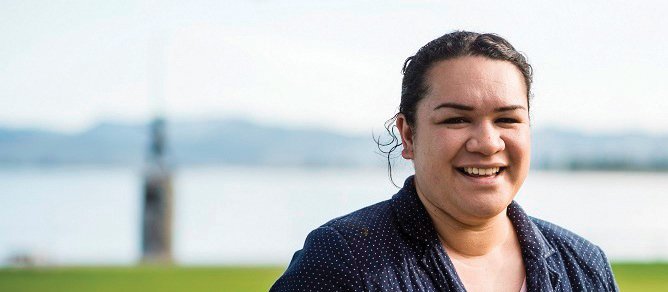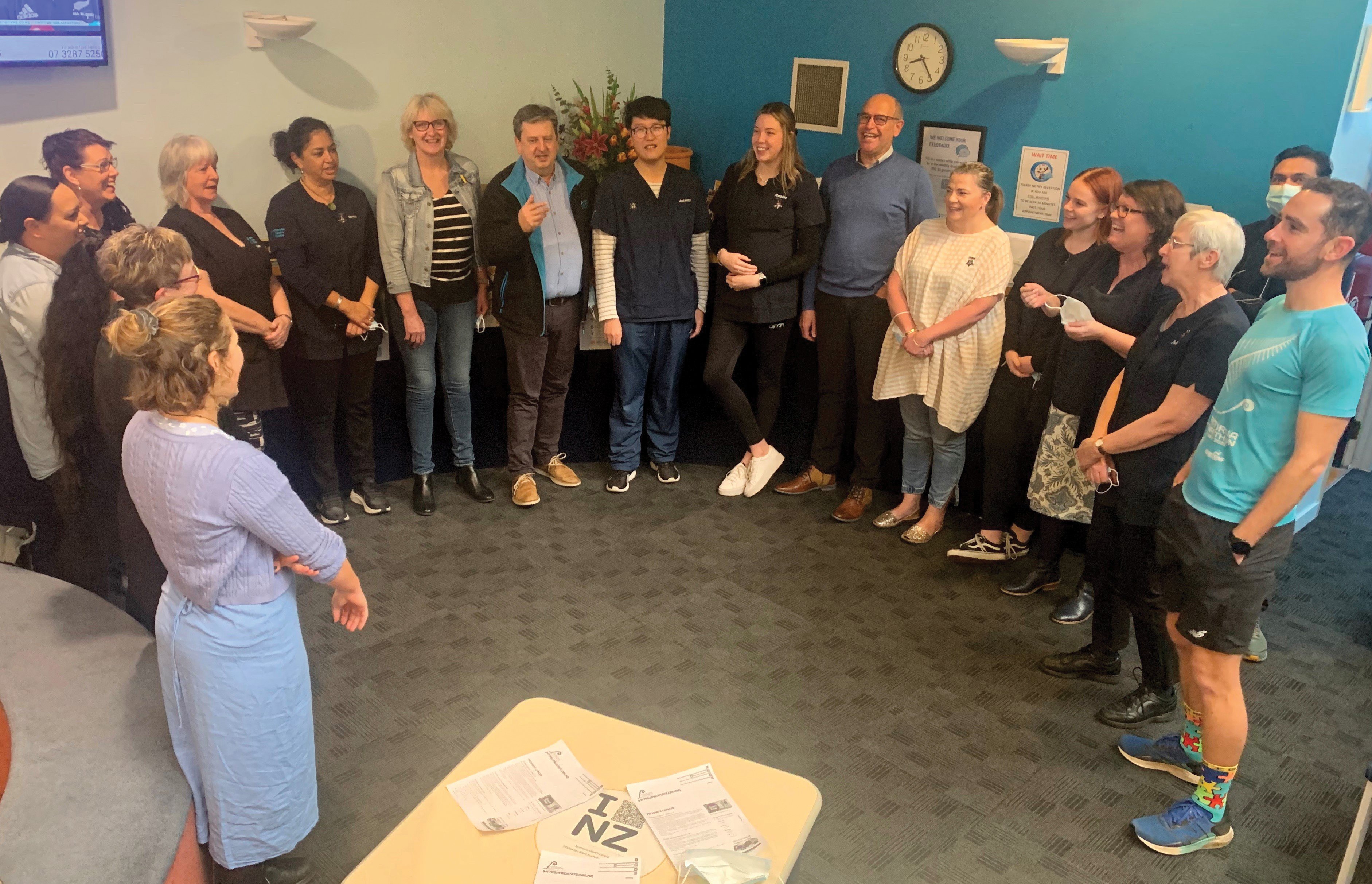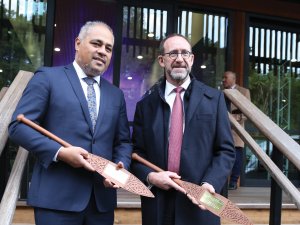Respiratory physician Lutz Beckert considers chronic obstructive pulmonary disease management, including the prevention of COPD, the importance of smoking cessation and pulmonary rehabilitation, and the lifesaving potential of addressing treatable traits. He also discusses the logic of inhaler therapy, moving from single therapy to dual and triple therapy when indicated, as well as other aspects of management
Small language steps, big rewards follow
Small language steps, big rewards follow

With Te Wiki o Te Reo Māori – Māori Language Week upon us this week, reporter Alan Perrott talks to two practices about the risk and reward of taking a bold move and trying something new
it has helped our team survive this pandemic intact
It’s okay to feel nervous about tackling te reo Māori, says Aramoho Health practice manager Therese Zimmerman.
If you take it slowly, the rewards might surprise you, Ms Zimmerman says. “I’m no guru or expert in this, but we just started off by making small changes a few years ago, like changing our greetings in emails and on Facebook, and over time they’ve just become what we do.
“My confidence has improved. I’m still not great at pronunciation, but when you’re part of a team, all doing the same thing, I do feel more comfortable trying and some of that fear of getting it wrong has gone away.”
The Whanganui practice began normalising use of te reo Māori to earn the equity module for RNZCGP Cornerstone accreditation.
“That gave us a goal, which really helped push us along,” Ms Zimmerman says. It has been a gradual revolution, with use of written greetings followed by introduction of new phrases at staff meetings, then by learning waiata, karakia and whakataukī.
It helps that the practice has a former opera singer on staff, she says, and there is also safety in numbers as the practice has 40 staff, including 10 GPs, 15 nurses, a health improvement practitioner and a health coach.
All significant events at Aramoho Health now feature a mihi and waiata.
The practice runs a te reo Māori haiku competition. If the poems aren’t brilliant, it’s fun finding the right words to fit the rigid syllabic structure, Ms Zimmerman says.
They have even extended to medical applications, with health improvement practitioner Maggie Mowat holding waiata classes via Zoom to aid patients with breathing, calmness and wellbeing.
Te reo Māori is also used by staff at community-based vaccination clinics and Ms Zimmerman says the feedback from staff and patients has been overwhelmingly positive.
For Te Wiki o Te Reo Māori – Māori Language Week, she is putting together a playlist of songs.
Across town and via email, Three Rivers Medical practice owner and doctor Hiria Nielsen (Ngāti Porou, Rongomaiwahine, Ngāi Tāmanuhiri) admits to trepidation of her own about introducing te reo Māori to her workplace.
“As a Māori doctor and practice owner, I also had to put aside my fear of sharing aspects of te ao Māori with my work whānau. The fear of ‘doing something wrong’ or being judged by kaumātua and other Māori was crippling, but sharing karakia, waiata and tikanga with my colleagues can only help us connect with our community, so I decided to go for it.”
Despite being busy, staff set aside weekly 15-minute sessions for waiata and karakia. Whakairo (carvings) and rāranga (weaving) are displayed around the building to create an inviting space for Māori patients.
Dr Nielsen is also planning a staff trip to her haukainga (home) in Te Mahia and has commissioned a korowai for graduations.
While their journey is only starting, she says it has already had interesting spin-offs. During the height of the pandemic response, a GP emailed an image of his maunga back in the US. “This cascaded into all staff attaching their pepeha to his email and it became a way of connecting at a difficult time. It was also one of our doctors from Scotland who asked for waiata, and she sang our waiata at her daughter’s graduation from medical school.”
Dr Nielsen admits to some pushback from a tiny minority of patients who say the practice should focus on seeing more patients rather than self-care.
“So, I would say to other practices, do it. Seriously, just do it. It might feel like the least important thing to do given the current challenges, but it has helped our team survive this pandemic intact. After meetings and huddles, it is a great feeling to pick up the guitar and finish on a happy note before we roll our sleeves up and get into our mahi.
“A big mihi to all our primary care teams around the motu putting in the hard yards, noho ora mai.”
Ideas include:
- taking small steps first, such as using te reo in written greetings then introducing new phrases at staff meetings and learning waiata, karakia and whakataukī
- running a te reo Māori haiku competition, and
- holding 15-minute practice sessions for waiata and karakia each week.
We're publishing this article as a FREE READ so it is FREE to read and EASY to share more widely. Please support us and the hard work of our journalists by clicking here and subscribing to our publication and website








![Barbara Fountain, editor of New Zealand Doctor Rata Aotearoa, and Paul Hutchison, GP and senior medical clinician at Tāmaki Health [Image: Simon Maude]](/sites/default/files/styles/thumbnail_cropped_100/public/2025-03/Barbara%20Fountain%2C%20editor%20of%20New%20Zealand%20Doctor%20Rata%20Aotearoa%2C%20and%20Paul%20Hutchison%2C%20GP%20and%20senior%20medical%20clinician%20at%20T%C4%81maki%20Health%20CR%20Simon%20Maude.jpg?itok=-HbQ1EYA)
![Lori Peters, NP and advanced health improvement practitioner at Mahitahi Hauora, and Jasper Nacilla, NP at The Terrace Medical Centre in Wellington [Image: Simon Maude]](/sites/default/files/styles/thumbnail_cropped_100/public/2025-03/2.%20Lori%20Peters%2C%20NP%20and%20advanced%20HIP%20at%20Mahitahi%20Hauora%2C%20and%20Jasper%20Nacilla%2C%20NP%20at%20The%20Terrace%20Medical%20Centre%20in%20Wellington%20CR%20Simon%20Maude.jpg?itok=sUfbsSF1)
![Ministry of Social Development health and disability coordinator Liz Williams, regional health advisors Mary Mojel and Larah Takarangi, and health and disability coordinators Rebecca Staunton and Myint Than Htut [Image: Simon Maude]](/sites/default/files/styles/thumbnail_cropped_100/public/2025-03/3.%20Ministry%20of%20Social%20Development%27s%20Liz%20Williams%2C%20Mary%20Mojel%2C%20Larah%20Takarangi%2C%20Rebecca%20Staunton%20and%20Myint%20Than%20Htut%20CR%20Simon%20Maude.jpg?itok=9ceOujzC)
![Locum GP Helen Fisher, with Te Kuiti Medical Centre NP Bridget Woodney [Image: Simon Maude]](/sites/default/files/styles/thumbnail_cropped_100/public/2025-03/4.%20Locum%20GP%20Helen%20Fisher%2C%20with%20Te%20Kuiti%20Medical%20Centre%20NP%20Bridget%20Woodney%20CR%20Simon%20Maude.jpg?itok=TJeODetm)
![Ruby Faulkner, GPEP2, with David Small, GPEP3 from The Doctors Greenmeadows in Napier [Image: Simon Maude]](/sites/default/files/styles/thumbnail_cropped_100/public/2025-03/5.%20Ruby%20Faulkner%2C%20GPEP2%2C%20with%20David%20Small%2C%20GPEP3%20from%20The%20Doctors%20Greenmeadows%20in%20Napier%20CR%20Simon%20Maude.jpg?itok=B0u4wsIs)
![Rochelle Langton and Libby Thomas, marketing advisors at the Medical Protection Society [Image: Simon Maude]](/sites/default/files/styles/thumbnail_cropped_100/public/2025-03/6.%20Rochelle%20Langton%20and%20Libby%20Thomas%2C%20marketing%20advisors%20at%20the%20Medical%20Protection%20Society%20CR%20Simon%20Maude.jpg?itok=r52_Cf74)
![Specialist GP Lucy Gibberd, medical advisor at MPS, and Zara Bolam, urgent-care specialist at The Nest Health Centre in Inglewood [Image: Simon Maude]](/sites/default/files/styles/thumbnail_cropped_100/public/2025-03/7.%20Specialist%20GP%20Lucy%20Gibberd%2C%20medical%20advisor%20at%20MPS%2C%20and%20Zara%20Bolam%2C%20urgent-care%20specialist%20at%20The%20Nest%20Health%20Centre%20in%20Inglewood%20CR%20Simon%20Maude.jpg?itok=z8eVoBU3)
![Olivia Blackmore and Trudee Sharp, NPs at Gore Health Centre, and Gaylene Hastie, NP at Queenstown Medical Centre [Image: Simon Maude]](/sites/default/files/styles/thumbnail_cropped_100/public/2025-03/8.%20Olivia%20Blackmore%20and%20Trudee%20Sharp%2C%20NPs%20at%20Gore%20Health%20Centre%2C%20and%20Gaylene%20Hastie%2C%20NP%20at%20Queenstown%20Medical%20Centre%20CR%20Simon%20Maude.jpg?itok=Z6u9d0XH)
![Mary Toloa, specialist GP at Porirua and Union Community Health Service in Wellington, Mara Coler, clinical pharmacist at Tū Ora Compass Health, and Bhavna Mistry, specialist GP at Porirua and Union Community Health Service [Image: Simon Maude]](/sites/default/files/styles/thumbnail_cropped_100/public/2025-03/9.%20Mary%20Toloa%2C%20Porirua%20and%20Union%20Community%20Health%20Service%20in%20Wellington%2C%20Mara%20Coler%2C%20T%C5%AB%20Ora%20Compass%20Health%2C%20and%20Bhavna%20Mistry%2C%20PUCHS%20CR%20Simon%20Maude.jpg?itok=kpChr0cc)